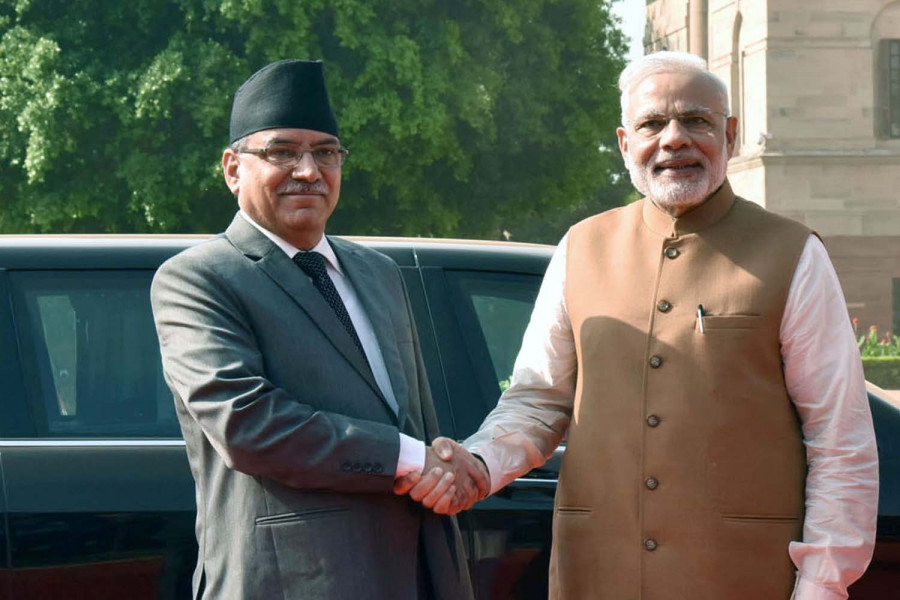National
Energy deals expected during Dahal’s India visit, says Foreign Minister Saud
Both sides reportedly working to find entry route via Indian skies to ease flights from Bhairahawa international airport.
Anil Giri
As Prime Minister Pushpa Kamal Dahal prepares to travel to India for his first foreign state visit in his third term in office, the two sides have entered the final stage of negotiations, discussing draft agreements to be signed and announced during the visit as well as the text of the joint communiqué that would conclude his visit.
The two sides will formally announce on Saturday the state visit of Dahal to New Delhi from May 31-June 3 at the invitation of Indian Prime Minister Narendra Modi.
Foreign Minister NP Saud told the Post on Thursday that “preparations for the prime ministerial visit are in the final stage.” With the visit agenda and logistics like the size of the delegation being finalised, Nepal’s Ambassador to India Shankar Sharma met India’s External Affairs Minister S Jaishankar in New Delhi on Thursday.
According to Saud, “a host of issues will be discussed, including on water resources, energy cooperation, trade, commerce, transit and infrastructure, and some bilateral agreements will be signed.”
Officials privy to the developments said that some agreements, some memoranda of understanding and some ground-breaking ceremonies will materialise after delegation-level June 1 talks between Dahal and Modi in New Delhi.
More than half a dozen agreements and memoranda of understanding will be signed and announced, two Nepali officials—one from the Prime Minister’s Office and the other from the Ministry of Foreign Affairs—informed. The agreements will likely include subscribing to a digital payment mode that would ease cross-border payments using e-wallet and building of bridges in Chandani-Dodhara and the Jhulaghat areas across the Mahakali River in Kanchanpur and Darchula districts respectively, if it’s agreed to by both sides.
“Nepal is also seeking Murrah buffalos from India,” an official at the Ministry of Agriculture said. “There is no agreement on the number, but negotiations are underway,” he added.
A further extension of the India-funded petroleum pipeline inside Nepali territory, construction of integrated check posts in Bhairahawa, Chandani-Dodhara and Nepalgunj, developing the Phukot-Karnali hydroelectric plant with an installed capacity of 480 megawatts, handover of the new 17-km expanded railway line to Bijalpura in the Jayanagar-Kurtha-Bijalpura-Bardibas railway section could also be announced during the state visit, officials said.
According to the sources, there will be an agreement on a new petroleum pipeline to be constructed from Siliguri to Jhapa and storage facilities and extension of present Motihari-Amlekhgunj petroleum pipeline to Lothar, Chitwan.
“The trial run of the new railway line was carried out successfully,” a senior official at the Ministry of Transportation and Physical Infrastructure said, adding, “during the visit, this railway line will be handed over to the Nepali side.”
Similarly, talks are on to receive the Biratnagar-Bathnaha (India) railway line, said the ministry officials. Besides handing over these two railway lines, the Indian side will provide the detailed project report of the Kathmandu-Raxaul railway, they added. During a recent meeting of the railway officials, the Indian side had only briefed its Nepali counterpart on the detailed project report, rather than handing it over.
“The Indian side is also expected to share the detailed project report of the Raxaul-Kathmandu railway for our consideration,” the ministry of transportation official said.
“On the air entry route via the Indian skies to facilitate international flights at the Bhairahawa international airport, officials on both sides are working on some alternatives. There could be some development by the end of the visit,” an official at the Ministry of Culture, Civil Aviation and Tourism said.
The boundary issue, too, will be “touched upon” during the bilateral talks, said an aide to the prime minister. “First, it will be discussed at the political level and then it will be given to some mechanism for resolution. It could be at the foreign secretary level or at a lower level, but the boundary matters will certainly be taken up during the visit,” he added.
Officials said that other possible agreements are related to biodiversity, supply of chemical fertiliser by India and cross-border energy cooperation, including energy trade and construction of the transmission line between Butwal and Gorakhpur. There could also be a deal on the interconnection service agreement of the Butwal-Gorakhpur cross-border transmission line. The state-owned Nepal Electricity Authority and the Power Grid Corporation of India have signed an agreement to develop the 400KV Butwal-Gorakhpur Cross-Border Transmission Line on the Indian side with joint investment. Nepal will, however, develop the section of the proposed cross-border transmission line on its side. As things stand, around 120km of the transmission line’s 135 km length would lie in the Indian territory.
One energy ministry official said that “talks are going on for the development of the 679MW Lower Arun Hydropower project in eastern Nepal.” The $1.3 billion project, the single biggest carried out with foreign investment, as per the 2017 cost estimates, is located in Sankhuwasabha and Bhojpur districts.
This will be the second mega-project undertaken by the southern neighbour after the $1.04 billion 900-MW Arun-3 hydroelectric project on the Arun River. “Negotiations are still on between the two sides, so we cannot say what will happen by June 3,” the official added.
The Nepali side is also pitching for long-term energy trading with India where the Nepal Electricity Authority doesn’t have to take approval for the trade with India on a piecemeal basis, the official at the energy ministry said. There is also a proposal on the table regarding the amendment in Nepal-India Bilateral Transit Treaty and officials hope that an agreement on it can be reached before the joint communiqué is made public.
“The major takeaway of the visit would be cooperation in energy and hydropower sectors,” said Saud, the foreign minister. “The sides have reached agreement on some issues, while some issues are still being discussed.”




 8.54°C Kathmandu
8.54°C Kathmandu















